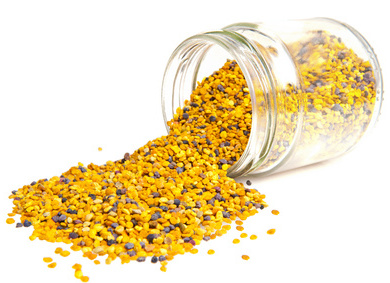 Bee Pollen.
Bee Pollen.
Bee pollen, or more correctly flower pollen, is a popular, easily digestible highly nutritious food which offers an astounding array of nutrients needed by the human body for healthy functioning.
It is considered to be one of the nature's most complete and nourishing superfoods, with all its nutrients working in perfect synergy with each other. (Ref. 1)
It takes bees literally hundreds of hours to collect pollen from flowers and turn it into food as we know it.
Bee pollen is a very rich source of carbohydrates, proteins, amino acids, lipids, vitamins, minerals and trace elements, and polyphenols (mostly flavonoids). (Ref. 1)
Pollen also stands out for its hight content of valuable ribonucleic acid, RNA, and deoxy-ribonucleic acid, DNA, both of which can potentially correct some genetic deficiencies within our bodies and, of course, boost the immune system. (Ref. 2)
Consuming bee pollen on a regular basis can, no doubt, dramatically increase our energy levels and improve general well-being.
Taking other whole foods, ex. chlorella powder and guarana powder, in combination with bee pollen may deliver even better results in the long-term.
Bee pollen could also be a good source of nutrition for tiredness, especially for those with serious vitamin deficiencies as it can quickly bring our system back to its optimal vitamin and mineral levels.
Pollen is such a rich source of great nutrition that we cannot go wrong by choosing to add it to our diets.
Many athletes take this food for better strength and performance.
A lot of research into bee pollen's potential health benefits has now been conducted. Researchers suggest that its phenolic content, among many other compounds, may reduce the risk of chronic diseases, such as cancer, inflammation, cardiovascular and neurodegenerative disorders. (Ref. 3)
Precautions: Some sensitive individuals may take allergies to bee pollen.
Written by: Irina Bright
Original publication date: 2013
Updates: 2020
Republication date: 2020
References.
1. Carla Nogueira, Antonio Iglesias, Xesus Fes, and Leticia M. Estevinho (2012). Commercial Bee Pollen with Different Geographical Origins: A Comprehensive Approach. Published in International Journal of Molecular Sciences. Retrieved May 31, 2013 from: https://www.ncbi.nlm.nih.gov/pmc/articles/PMC3472737/
2. Mercola.com (2013). The Use of Bee Pollen as a Superfood. Retrieved May 31, 2013 from: https://www.mercola.com/article/diet/bee_pollen.htm
3. Eduarda Moita, Angel Gil-Izquierdo, Carla Sousa, Federico Ferreres, Lus R. Silva, Patrcia Valento, Ral Domnguez-Perles, Nieves Baenas, and Paula B. Andrade (March 2013). Integrated Analysis of COX-2 and iNOS Derived Inflammatory Mediators in LPS-Stimulated RAW Macrophages Pre-Exposed to Echium plantagineum L. Bee Pollen Extract. Published in PLoS One. Retrieved May 31, 2013 from: https://www.ncbi.nlm.nih.gov/pmc/articles/PMC3592834/